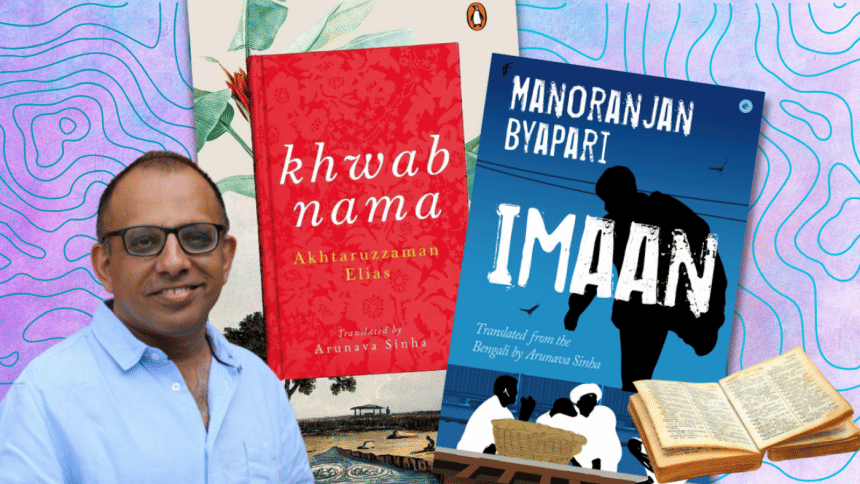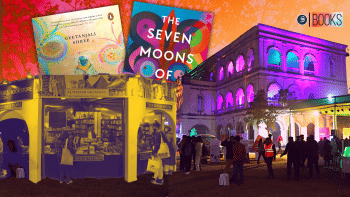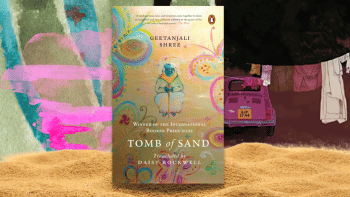‘We are translators every day’: Arunava Sinha

What drives you to choose a text for translation? Is there a sociopolitical or cultural aspect, or a literary richness in the text that leads you to choose it?
Well, I wish I could give you a complex answer to this, but the answer is actually quite simple. I just pick books that I love and books that I feel others should read. It's as simple as that. Added to that is the point of whether I think I will be able to translate that book. I believe that not every book is meant for every translator. So, a book will also find a translator who is best equipped to translate it. So, I also take that as a decision to perhaps sometimes say, "This is not for me." But other than that, initially, this was all it was — do I love this book? Do I love this book? Do I want others to read it?
Since then I have paid some attention to whether the writer is marginalised, whether the writer's voice needs greater amplification and so on. These things have become important in the publishing context. But other than that, not much. I will of course not translate books that come from an ideological space that I abhor. Other than that, I'm open to anything. It's all based on whether I really love the book or not.
Why did you prefer translations to writing texts of your own?
I have no story to tell. Why add to the noise? I don't have anything extraordinary to say of my own or anything incredible to add to the already large volume of superlative literature out there. So, why not use my time and abilities such as they are to take great literature from one language into another instead of adding to the noise by just saying I've published my own book. I know it's not going to be a good book, or a great book. So, why would I do it?
Do you feel that you need more critics than you have right now? Do you feel the need for criticism?
Most definitely. I do feel the need for criticism. I need people to tell me what can be better, and what didn't work. I've had a few people tell me those things so those are very useful. But I certainly want people not to be blinded, but to read with open eyes and an open mind and to honestly take each work on its own merits rather than associate it with any kind of reputation the translator may have. That's how I would read, and that's how I would want others to read and respond as well.
What I have found is that very often the criticism of translation comes from this notion that, "This is such a good book in Bangla (or any other language) that it could never be translated. Therefore, the translation must be bad." This is the kind of response I've faced from people who haven't even read the translation. They're criticising on principle. Which I respect — if you believe that translations can never match the first version, by all means you are entitled to that viewpoint. But then it's of no value to me, because that is a generalised position which is not really responding to my translation in any way whatsoever. So, I'll listen to it, but I won't learn anything from it.
I believe in translation. So, I would like to hear from people who also believe in translation but feel that my translation was not up to the mark. That would make sense. Then I would really like to know where the gaps were. And there would be an opportunity for open conversations as well. Which is essential. What I feel the lack of is open conversations on translations.
All the questions in literature festivals and so on all come from people who have not read the translation, so they don't ask specific questions. They end up asking the same generalised questions — What is your process of translation? How do you translate so many books? What was the most challenging thing? Which is your favourite translation? Who was difficult to translate? These are questions you can ask anybody. They are not unique to the person you're talking to.
So, I would like someone to pick up a book I've translated, go over it, pick up examples, talk about specific things in the text and ask me, What were you thinking when you translated this? This is perhaps what my thought was when I read your translations. Would you like to engage with my ideas? And I would love to engage with deep readers' ideas on what they're reading and listen to them, maybe with different versions and different interpretations. Show me where I may have misread the text altogether, which is entirely possible. I am neither ashamed nor proud of saying that I may well misread texts, like every other human being.
I could also argue that no text can be misread, because the reader will make what they will of the text. It is not the reader's responsibility to guess the writer's intention. The text exists out there on its own. But having said that, you can make some gross errors of interpretation out of ignorance, which is different. If you absolutely don't get a reference, if you cannot grasp the meaning, perspective, or history, then that's a misreading. So, I would love to have open conversations on these, get a chance to correct myself, and maybe a new edition will come out with a revised version. I really miss these, and I feel their lack for sure. There is a big lack of discourse.
How do you define a professor of practice? Does it lead to any conflicts with traditional academic practices?
So, the idea is that it very clearly underlines the fact that I do not come from an academic space. I teach in an academic space but my credentials are not academic credentials. In fact, I only have a Bachelor of Arts degree. I don't have a Masters even, leave alone a PhD. The reason I have been asked to teach is because I bring a certain experience of my practice, which is translation. So, the courses I teach are very practical courses in translation. I don't even teach translation theory or anything like that. I teach people how to write, and that comes from my own experience of writing. This has been pioneered by universities in America, where they bring in certain practitioners of certain arts to teach, and they're called professors of the practice.
Do you think artificial intelligence could take over human intelligence in terms of the craft of translation?
No. The simple answer is no. Artificial intelligence can do a great job of giving you meanings of individual words. Maybe two words. The moment you put three words together, there's a context. It's a story that does not limit itself to the dictionary meanings of those three words. Maybe one day it will be developed if it takes enough input from human translators. At the moment, it is developed by software engineers, so it can't because they bring a brutal analytical part to it.
And we are translators every day, by the way. Everybody is a translator. We're forever taking things and ideas and thoughts that existed in one medium and putting it in another. We're starting with finding the right words for your thoughts, to conveying what you're thinking to someone else, to listening to something on the street and putting it in your own words when you recount it to someone. Everything is an act of translation. And these are so strongly located in your own mind and your own heart and your own experiences that every such reading and therefore every such translation is unique. If you read two translations of the same text, you'll find that they're different. They use a different set of words, they arrive at slightly different places although they are clearly the same text, and yet they are not the same text. AI doesn't work in that direction. AI treats it like a crossword puzzle — there can be only one answer.
If all you're looking for is to get the sense of something or the information that is conveyed, then yes, you can. For example, AI will be great if you travel to a foreign country, don't understand the language, and want to do transactions or have conversations. Where information is everything, AI will do a great job of it.
But literature? No. That's the whole point. If the sentence or text it is translating is very very simple, it might accidentally arrive at a good translation, simply by maintaining the simplicity because there's not much depth behind it. The moment you have a text that is deep, that is ambiguous, that conveys as much through silence as sound, as much as what is not said as to what is said — finished. It's never going to happen. Think of all you read: when you read you imagine, you visualise, you hear sounds. Reading is not just an internalisation of words.
Look, art is art. You cannot say that I don't want to spend money or I want speed and therefore I am going to turn it into a repeatable process. Art is not a repeatable process. That's the whole point. If you acknowledge that my film is art and the dialogue is art in the original language, but I'm going to bring a completely different method to take it into another language, then you are being stupid. It's not an encyclopaedia, which is a compendium of information. If it is, then that's fine. If my job is to take this information into another language, maybe machine translation will do the job well. But if you're acknowledging that in the first place your original is a work of art, then you have to mediate through other artistic processes.
There's a lot of talk nowadays about creating images through AI. It's all the rage. You feed in ideas and it will come back to you with images. But what is it doing actually? It is delving into a huge bank of images, and say okay, this image seems to match what you're talking about. There is no artistic impulse behind it. It is brute numbers. And then somewhere it is claiming that mimicking a process makes it as deep as the process itself. There is a school of artificial intelligence that says you can create artificial intelligence by mimicking the neural structure of the human brain. So, you create a simulated version of the brain, which has exactly as complex a structure as the human brain, and miraculously it will start doing intelligent things. So, it's a very mystical idea, where you don't know how something works but feel that you can make something else that works the same way by copying the surface.
Do you have any advice for amateur translators who want to take it as a profession?
First, don't take it as a profession that will pay your bills. Take it as a profession that is your passion. Treat it like a profession, but don't expect all that comes from a profession. Two, read furiously. For every book that you translate, read a hundred books, both in the language from which you're translating and the language into which you're translating. Three, read not just with your eyes but with your ears and your entire mind and your entire body, and I use the word body advisedly. Let the book talk to every part of you. Let the book talk not just to your intellectual mind, but also to your heart. Also to the core seat of your emotional responses, to the seat of your instinctive and psychological responses.
You must read like a reader and not like an academic student. If the book you're translating is a general book, it's going to be read by readers. Intelligent readers perhaps, but readers nevertheless. Not people who are looking to analyse or dissect, but people who are looking to feel that book in their heads and in their hearts and in their stomachs. And remember that a book means many things. You cannot reduce it to one thing. So, don't say "I've understood what this book means and I'm only going to translate what it means." No, it does not mean anything. It means what every reader wants it to mean. So, your translated version must give the reader the same options, the same possibilities as the original text did.
And practise. Practise all the time. Don't just work on the book that you're translating. Practise with other passages, practise with poetry, practise with drama.Very importantly, listen to how people talk in the language into which you're translating. Because a lot of books have dialogue, and getting dialogue right is tough. If you're translating into Bangla, listen to how people talk in Bangla. If you're translating into English, listen to how people talk in English. Eavesdrop. Shamelessly eavesdrop on conversations. There's no other way of knowing how people talk.
So, these are important things. You have to live like a writer and get all your material with your ears and your eyes and your memory from the real world, and bring them all into your translation.
Mashiur Rahman is an MA graduate from Creative Writing, while Naimul Islam and Suraiya Alam are pursuing their MA in Cultural Studies, at ULAB.

 For all latest news, follow The Daily Star's Google News channel.
For all latest news, follow The Daily Star's Google News channel. 











Comments